When watching cinema, I generally view it for its messages and values rather than for its cinematography. Sometimes, however, it is difficult to elude it, as a film like Battleship Potemkin (1925) attests. It has astonishing moments, like the famed Odessa Steps steps scene illustrates, but its overriding message of the rise of the proletariat and the crushing of the bourgeois is truly stomach-turning. Also, while taking these segments out of the film and watching them individually are, no doubt, fascinating, viewing the entire film linearly is quite frustrating and its merit as a great piece of narrative is dubious. (I saw Eisenstein's October yesterday and, yet again, while many of its scenes are cinematographically spellbinding, viewing it was a real chore.)
It's not, generally speaking, solely propaganda cinema from this period that irritates me, a lot of silent cinema's messages from this period are very naive and amorphous. I recently saw the re-release of Fritz Lang's Metropolis (1927) and was fascinated by it, but its message of a 'mediator uniting the head and the heart' made me cringe indubitably and, despite Lang's fervid disassociation from the Third Reich, could be seen as a contribution to the ideology of Nazi Germany.
I guess one has to dispel these notions and accept all this as inherent to silent cinema because, as this was an extremely recent art-form and still in its evolving stages, it is bound to be incomplete and semantically ambiguous.
A scary thought about many propaganda films is the impact they had on audiences and the way they manipulated them. Audiences were far more impressionable in the early 20th century, and could be conned into an ideological belief with far greater ease. Hitler's rhetoric methods worked overwhelmingly well, for instance, and add to that the mere experience to going to the cinema (which was something overwhelming and new at the time), and swarms of people are attracted.
D. W. Griffith's Birth of a Nation (1915) distorted American history (in a similar way as Eisenstein did with Soviet history in October) to express vile racial politics and to glorify the Ku Klux Klan. Lasting more than three hours, it was the first feature film to receive vast public distribution and made an indelible impact on the public. The Ku Klux Klan had been inactive for decades, but resurfaced after the screenings of the film and garnered more members than it had in its previous inceptions. Once more, the film continues to receive praise to this day for its ground-breaking cinematography, but it is unthinkable not to bring its values into question and the terrible repercussions on the public.
Thursday, 30 September 2010
Monday, 27 September 2010
Ipod shuffle #3
1. Concret PH - Iannis Xenakis
After the aftermath of World War II there was a whole generation of young European composers who had lived through a great deal of noise with the bombings of major cities. With the advent of technology, it was possible to recreate these otherworldly sounds through electronic studios. This process was called musique concrete. Xenakis is perhaps the most difficult of all the post-war composers; when I listen to his music by no means do I understand all the mathematical and architectural procedures that he underwent to crate it. I listen to it purely on its own terms as a non-musician. This track includes lots of crackles and white noise and is quite intriguing.
2. VII - Olivier Messiaen
I downloaded this quite a while ago and it doesn't say here what album it is from. It is similar to his piece Turangalilla. It is a very entertaining piece; the music bounces back and forth, undergoing many tangents. It is all ingeniously orchestrated and arranged. It starts off fairly light-hearted and pleasant, it restrains itself with frenetically accelerated xylophones until it erupts and there are large clusters of sound and cacophony that belie everything it preceded.
3. String Trio 02 - Krysztof Penderecki
The cello starts off playing this fast line, the violin joins in and plays it simultaneously until the viola comes. The track proceeds onto diving into a melange of aggressive lines. The lines seem to be contradictory yet strangely complementary. About half-way through they play together this forceful vehement attack on their instruments, very reminiscent of the fifth movement of Bartok's fourth quartet. This piece strongly mirrors and draws from Bartok.
4. Symphony No. 46 ('The Green Mountains') - Alan Hovahaness
In strong contrast to the previous three pieces, this is very harmonious and melodic. Hovhaness is a little-known and seldom cited 20th century composer who is one of the most prolific of all time: his opuses number over 400, and not many of them are played that often. I read a book once that described his music as 'muzak,' and I beg to differ. It does sound quite cliched and dated, but it makes up for a very enjoyable listen. This movement sounds like a substantial score that Moriconne could have written.
5. Hot Tubs Full of Brand New Fuel - The Locust
The Locust play a visceral attack on their instruments, creating music that is stimulating, chaotic and exhilarating. One of the players said something along the lines of "I want to change the way people see music, or maybe just destroy it in general." I find a lot of noise music mindless and boring, but The Locust are very accomplished players who interject noisecore with obtuse rhythms that make you want to move.
Saturday, 25 September 2010
The comics of my youth #3
This is a comic I read repeatedly as a youngster, when football was my main passion. It concerns a football team of youngsters called 'Barrabases,' and they wear the same strip as Chile. Unlike Chile, however, they win 100% of the time.
I thought that it had gone out of print for years, but apparently they have started to re-issue old copies, much to my delight.
These scans are from a strip about 'Palmatoria,' a Brazilian player who plays for Barrabases. The black player in the current Chile squad, Beasajour, has been nicknamed 'Palmatoria'. The last two scans are about lavatorial humour.
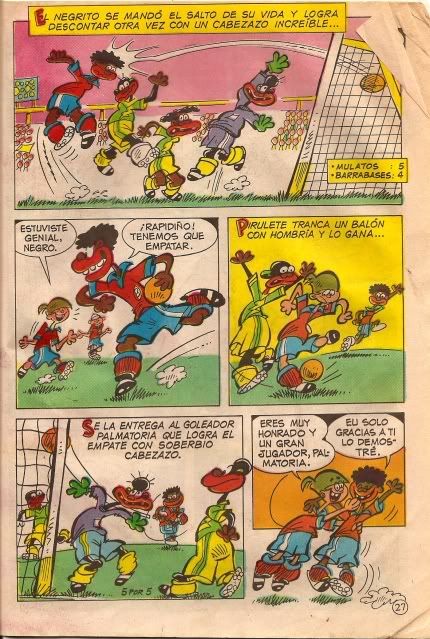
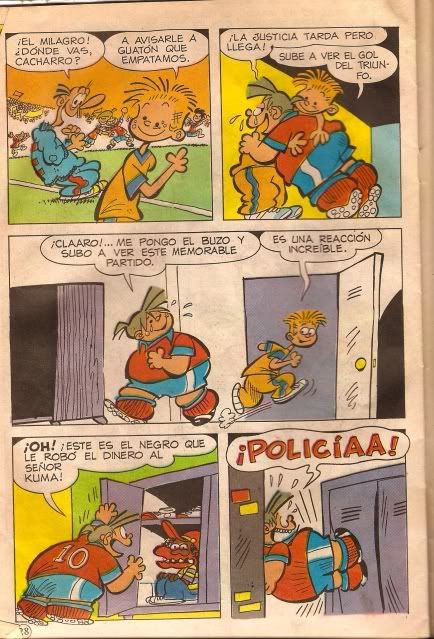
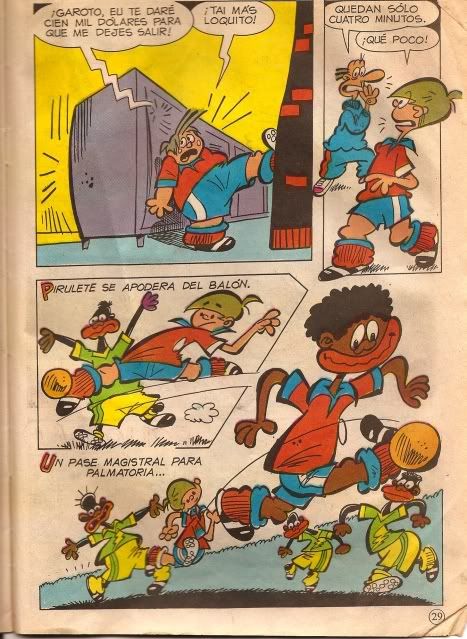
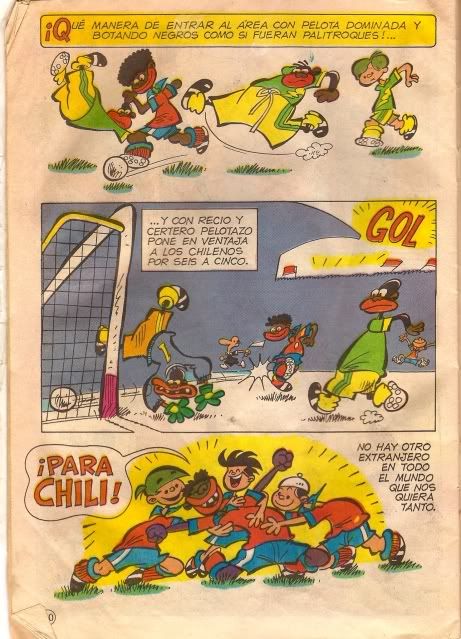
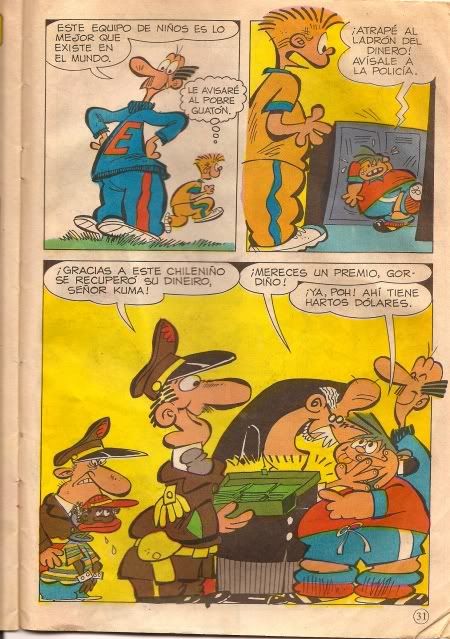

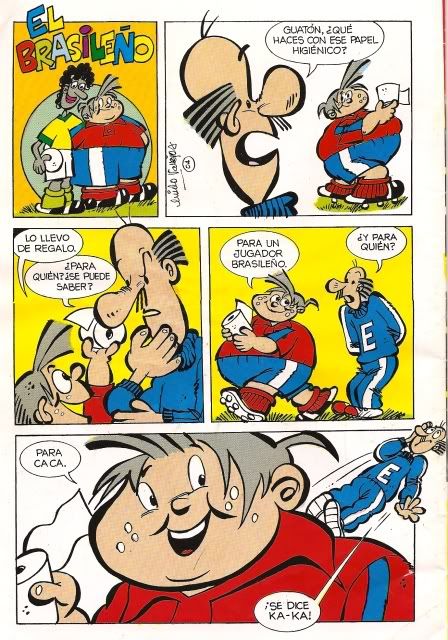
I thought that it had gone out of print for years, but apparently they have started to re-issue old copies, much to my delight.
These scans are from a strip about 'Palmatoria,' a Brazilian player who plays for Barrabases. The black player in the current Chile squad, Beasajour, has been nicknamed 'Palmatoria'. The last two scans are about lavatorial humour.
Barrabases







Wednesday, 15 September 2010
Artist of the month #5
Frank Zappa

"Information is not knowledge; knowledge is not wisdom; wisdom is not truth; truth is not beauty; beauty is not love; love is not music; music is the best."
Frank Zappa is easily one of the most misunderstood figures of the 20th century. Often dismissed as a drug user or hippie guitarist, people tend to overlook the vast body of work lurking beneath the surface.
Zappa was neither a drug user nor a hippie. A lot of people usually attribute these labels to him because of the way the media portrayed him. Not only are his achievements obscured and mystified by the media but also by his highly annoying, soul-less, nerdy fan-base who will form no opinions of their own and will hear nothing other than Frank Zappa. It does seem very daunting indeed to delve into his musical world, but his broad catalogue is no bigger than that of Ennio Moriconne, Sun Ra, John Zorn or countless classical composers.
Zappa was born to a lower middle-class family of Italian, Greek, Arab and French ancestry in 1940. Frank's father was a chemist and his family were constantly on the move and relocated countless times. His father worked at a chemical warfare facility, so gas masks were stored all over their house in case of emergency. This marked a strong impression on his mind; numerous of his songs and lyrics allude to gas masks and germ warfare, including a song entitled 'Prelude to the Afternoon of a Sexually Aroused Gas Mask.' Perhaps due to exposure to mustard gas, in his childhood he suffered from asthma and numerous other health problems.
Around this time he was continuously involved in shenanigans with chemistry. He would play around with powders to produce explosions and was once almost expelled from one of his schools for handing over explosive chemicals to a group of young delinquent thugs who wreaked havoc. Although he was ferociously intelligent, Zappa was often bored and dissatisfied by school and could never integrate himself into communities after moving from one place to another so much. He was to become self-educated in every field he pursued. After a dangerous chemistry experiment backfired and harmed him, the young Zappa started turning his attention to music.
In 1956, Zappa's family moved to Lancaster, a small town in the Mojave desert. Here he met his friend, long-time companion and later nemesis Don Van Vliet (alias 'Captain Beefheart'). They would sit together and listen to rhythm and blues records until the early hours of the morning. Zappa would begin to keep a vast collection of R&B records; they would eventually number to over a thousand. Instead of spending his money on cars, drinking or other activities teenagers pursued in the fifties, he would spend all his money on rhythm and blues records. He began to be interested in the drums and eventually acquired a cheap drum set, performing in a few local blues groups.
After reading an article in the local paper about Edgard Varese's percussion piece Ionisation, Zappa became obsessed with the composer and sought endlessly for the record. According to Zappa, the article went something along the lines of what a terrible racket the music was. Eventually coming across a copy of Varese's Complete Works, Zappa was overwhelmed and offered the seller all the money he had. He didn't have enough, but the seller sold it to him anyway, explaining that no-one would ever buy hi-fi stereo sets after showcasing them with that album. Zappa immediately put it on his home's record player, and his mother was aghast with the monstrous sound emanating out of the speakers. He tried explaining to her that he really liked the music, and his mother let him hear it on the condition that he took the record player to his room and heard it there. His mother never saw the record player ever again.
Thus began Zappa's endless fascination with Varese's music and modern classical music. As a fifteenth birthday present, his mother allowed him to make a long-distance call. He tried calling New York, where Varese lived, but he was abroad in Europe and could not be contacted, so he spoke to his wife instead. Varese eventually sent him a letter thanking him for the interest in his music and invited him to his house to stay in New York, but this never came to fruition and Varese died in 1965, a year before Zappa released his first record. Zappa framed the letter and kept it displayed in his house all his life.
Zappa was fascinated by the angular, atonal rhythms in Varese's music, Ionisation in particular. His reasoning behind picking up the drums in the first place was his interest in sounds for their own sake. Later he discovered a copy of Stravinsky's Rite of Spring and through a teacher discovered the serialism of Anton Webern. Zappa was very intrigued by all this music, poring over the liner notes to memorise musical terms and phrases. He eventually taught himself to read music and started writing it thereafter.
It was then that Zappa began composing. He recounted later that his first pieces were serialist, but that "It was so ugly" when he heard them that this discouraged him from pursuing this mode of composing and return to the more melodic area. He had now switched from drums to guitar, and early recordings can be heard of him performing with Beefheart. In his final year of high school he hadn't accumulated enough points to graduate, but the teachers were so demoralised and infuriated with him that they made him graduate anyway. He left community college after one semester and married Kaythrn Sherman, attempting to make a career out of making music.
Much to his dissatisfaction, Zappa found himself playing guitar in doo-wop band at various night clubs. He managed to compose scores for two low-budget B-movies - The World's Greatest Sinner and Run Home Slow. With the money earnt from these scores, Zappa set up his own recording studio, 'Studio Z'. Here he would work relentlessly for hours on end, setting up a routine he would follow for the rest of his life. Some of the recordings featured a younger Beefheart, although none of these were ever released at the time.
Just as his first marriage began to dissolve, Zappa scripted the film Captain Beefheart Vs. Grunt People in 1964, thereby providing Don Van Vliet with a pseudonym. As the film went into pre-production, vice squads began to suspect that Zappa was producing pornographic films. An undercover official came in requesting for a pornographic tape recording for 100 dollars. Zappa faked an erotic recording along with a female friend and added musical accompaniment. Just as he was about to hand over the musical recording, police swarmed into the studio and stripped the studio of all its contents. Zappa was arrested for "conspiracy to commit pornography," and eventually imprisoned for ten days. When talking to the lawyer, he asked Zappa how 'stupid' he could be, explaining that this officer was the sort of person who hanged around toilets to catch queers. While Zappa had always been fairly cynical beforehand, this experience made a mark on him and he became outwardly suspicious and critical of all forms of corruption and American society in general, forming his anti-authoritarian stance.
Zappa was neither a drug user nor a hippie. A lot of people usually attribute these labels to him because of the way the media portrayed him. Not only are his achievements obscured and mystified by the media but also by his highly annoying, soul-less, nerdy fan-base who will form no opinions of their own and will hear nothing other than Frank Zappa. It does seem very daunting indeed to delve into his musical world, but his broad catalogue is no bigger than that of Ennio Moriconne, Sun Ra, John Zorn or countless classical composers.
Zappa was born to a lower middle-class family of Italian, Greek, Arab and French ancestry in 1940. Frank's father was a chemist and his family were constantly on the move and relocated countless times. His father worked at a chemical warfare facility, so gas masks were stored all over their house in case of emergency. This marked a strong impression on his mind; numerous of his songs and lyrics allude to gas masks and germ warfare, including a song entitled 'Prelude to the Afternoon of a Sexually Aroused Gas Mask.' Perhaps due to exposure to mustard gas, in his childhood he suffered from asthma and numerous other health problems.
Around this time he was continuously involved in shenanigans with chemistry. He would play around with powders to produce explosions and was once almost expelled from one of his schools for handing over explosive chemicals to a group of young delinquent thugs who wreaked havoc. Although he was ferociously intelligent, Zappa was often bored and dissatisfied by school and could never integrate himself into communities after moving from one place to another so much. He was to become self-educated in every field he pursued. After a dangerous chemistry experiment backfired and harmed him, the young Zappa started turning his attention to music.
In 1956, Zappa's family moved to Lancaster, a small town in the Mojave desert. Here he met his friend, long-time companion and later nemesis Don Van Vliet (alias 'Captain Beefheart'). They would sit together and listen to rhythm and blues records until the early hours of the morning. Zappa would begin to keep a vast collection of R&B records; they would eventually number to over a thousand. Instead of spending his money on cars, drinking or other activities teenagers pursued in the fifties, he would spend all his money on rhythm and blues records. He began to be interested in the drums and eventually acquired a cheap drum set, performing in a few local blues groups.
After reading an article in the local paper about Edgard Varese's percussion piece Ionisation, Zappa became obsessed with the composer and sought endlessly for the record. According to Zappa, the article went something along the lines of what a terrible racket the music was. Eventually coming across a copy of Varese's Complete Works, Zappa was overwhelmed and offered the seller all the money he had. He didn't have enough, but the seller sold it to him anyway, explaining that no-one would ever buy hi-fi stereo sets after showcasing them with that album. Zappa immediately put it on his home's record player, and his mother was aghast with the monstrous sound emanating out of the speakers. He tried explaining to her that he really liked the music, and his mother let him hear it on the condition that he took the record player to his room and heard it there. His mother never saw the record player ever again.
Thus began Zappa's endless fascination with Varese's music and modern classical music. As a fifteenth birthday present, his mother allowed him to make a long-distance call. He tried calling New York, where Varese lived, but he was abroad in Europe and could not be contacted, so he spoke to his wife instead. Varese eventually sent him a letter thanking him for the interest in his music and invited him to his house to stay in New York, but this never came to fruition and Varese died in 1965, a year before Zappa released his first record. Zappa framed the letter and kept it displayed in his house all his life.
Zappa was fascinated by the angular, atonal rhythms in Varese's music, Ionisation in particular. His reasoning behind picking up the drums in the first place was his interest in sounds for their own sake. Later he discovered a copy of Stravinsky's Rite of Spring and through a teacher discovered the serialism of Anton Webern. Zappa was very intrigued by all this music, poring over the liner notes to memorise musical terms and phrases. He eventually taught himself to read music and started writing it thereafter.
It was then that Zappa began composing. He recounted later that his first pieces were serialist, but that "It was so ugly" when he heard them that this discouraged him from pursuing this mode of composing and return to the more melodic area. He had now switched from drums to guitar, and early recordings can be heard of him performing with Beefheart. In his final year of high school he hadn't accumulated enough points to graduate, but the teachers were so demoralised and infuriated with him that they made him graduate anyway. He left community college after one semester and married Kaythrn Sherman, attempting to make a career out of making music.
Much to his dissatisfaction, Zappa found himself playing guitar in doo-wop band at various night clubs. He managed to compose scores for two low-budget B-movies - The World's Greatest Sinner and Run Home Slow. With the money earnt from these scores, Zappa set up his own recording studio, 'Studio Z'. Here he would work relentlessly for hours on end, setting up a routine he would follow for the rest of his life. Some of the recordings featured a younger Beefheart, although none of these were ever released at the time.
Just as his first marriage began to dissolve, Zappa scripted the film Captain Beefheart Vs. Grunt People in 1964, thereby providing Don Van Vliet with a pseudonym. As the film went into pre-production, vice squads began to suspect that Zappa was producing pornographic films. An undercover official came in requesting for a pornographic tape recording for 100 dollars. Zappa faked an erotic recording along with a female friend and added musical accompaniment. Just as he was about to hand over the musical recording, police swarmed into the studio and stripped the studio of all its contents. Zappa was arrested for "conspiracy to commit pornography," and eventually imprisoned for ten days. When talking to the lawyer, he asked Zappa how 'stupid' he could be, explaining that this officer was the sort of person who hanged around toilets to catch queers. While Zappa had always been fairly cynical beforehand, this experience made a mark on him and he became outwardly suspicious and critical of all forms of corruption and American society in general, forming his anti-authoritarian stance.
After been released from prison, singer Ray Collins invited Zappa to play guitar in his R&B band The Soul Giants. Zappa soon took charge of the band and convinced the members to play original material. The saxophonist of the band rejected this, saying that if they did that no bars would contract them. Sure enough, this was the case and the band could not get any work at the local bar joints of Los Angeles. The band was renamed 'The Mothers', which was short for 'Motherfucker,' a colloquial word for a musician who is good at his instrument. They increased in popularity in the underground scene with manager Herb Cohen, and band gained notoriety with a blues song about the Watts Riot called 'Trouble Every Day.' They caught the attention of producer Tom Wilson and they were signed to Verve Records, an auxiliary of MGM. The band's name was considered to be too outré for a major record label act, so the name was modified and Zappa stated "Out of necessity, we will become The Mothers of Invention."
The band set out to record their material for MGM. So the story goes, The Mothers laid down their love song doo-wop number 'Any Way the Wind Blows' and everyone was happy, but when they performed their bizarre number 'Who Needs the Brain Police?' Brian Wilson looked alarmed and made a desperate phone call to the label's authorities. This can't be too credible: Wilson had actually produced unorthodox jazz artists like Sun Ra and Cecil Taylor in the past, so he should have had a good grounding in experimental music. Zappa did, however, give credit to Wilson that he became more and more immersed in the project, which resulted in an unlimited budget for the project, permitting Zappa to have complete artistic control.
The Mothers' first record, Freak Out!, could be seen as a concept album in that each track had a function within the record. Zappa said "It wasn't as if we had a hit single and we needed to build some filler around it. Each tune had a function within an overall satirical concept." The album, The Simpson's creator Matt Groening noticed, was an incredible achievement in that "It managed to be both crude and ugly and immensely sophisticated at the same time." The album fused crude doo-wop, satirical rock songs and lush orchestration (composed and conducted by Zappa) along with a vicious, characteristic cynicism that indicted American culture of any sort. There was a notable final track, 'The Return of the Son of Monster Magnet', an out-and-out attempt at weirdness that included a vast amount of expensive percussion equipment. Accompanied by all this was Zappa's liner notes, cynically explaining the ethos of his music and listing all the influences that shaped his work.
Around this Zappa met Gail Sloatman who he remained married with for the rest of his life and had four children with (deliberately) unusual names: Moon Unit, Dweezil, Ahmet and Diva.
Following their second release, Absolutely Free, the band moved to New York in an augmented line-up that included broader instrumentation. Zappa later explained that he was bored by the scenes in other areas, but the scene that erupted in New York was more interesting him to him because of its musical experimentation and being "less conformist." The band constantly played music while implementing a great deal of theatricality; once they brought onto the stage US marines so that they could dismember baby dolls. Some audience members found it so shocking that they were in tears. Some of the band's technical abilities weren't of a high standard, but they performed an eclectic array of music, including Stravinsky.
Zappa's social commentary ruthlessly attacked everybody; he said "We are satirists and we are out to satirise everything." While in New York, he made two recordings that were halted for a year due to contractual reasons. He had written chamber and orchestral pieces that were eventually moulded and spliced together with meandering dialogue, eventually collected in Lumpy Gravy. The other album was an infuriated attack on 'Psychedelia' and the 'Flower Power' phenomena, entitled We're Only in it for the Money. The cover of the album parodied The Beatles' Sgt Pepper Lonely Hearts Club Band that, along with ingenious editing and musique concrete, included forthright lyrics like "Every town must have a place where phony hippies meet" or "Flower power sucks."
Moving away from New York, Zappa now reshaped The Mothers into a staggering chamber rock ensemble. The band would play music that could be termed jazz fusion, but ventured into several other territories as well. Like he'd do in other ways later in his career, Zappa would conduct the band with unusual signals, creating music that was rigidly constructed and improvised at the same time. His music around this time is arguably the best he ever made in his entire career. His music around this time was collected in Uncle Meat. Into 1969, the band weren't proving to be that financially viable (there were nine members all together). While this was the pretext Zappa used for disbanding the original Mothers, the probable reason was that Zappa didn't feel like he had as much control over the music as he wished. The band was disbanded and Zappa retreated into the studio for other work. Two more staggering albums of this period were released, titled Burnt Weeny Sandwich and Weasles Ripped My Flesh.
Zappa forayed into business in the late 60s, setting up the record labels 'Bizarre' and 'Straight' that were distributed by Warner Bros. Through this he released his own records and other artists whose work he produced, like the seminal double album, Trout Mask Replica, of his long-time friend and companion Captain Beefheart as well as releases by Wild Man Fischer, The GTOs, Alice Cooper and Tim Buckley.
When retreating into the studio, Zappa teamed up with ex-Mothers member Ian Underwood to produce the groundbreaking album Hot Rats. The record was a surprise in that was far more melodic and (relatively) smoother than anything from the Mothers. The album used advanced recording techniques, utilising a 16-track audio recorder. Underwoord played a substantial role in the record, often playing the lines of 8 to ten musicians on instruments as varied as piano, organ, flute, saxophones and clarinets. For the first time, there were considerably longer guitar solos from Frank. The album was a landmark in uniting jazz and rock - it had come out just about the same time as Miles Davis' Bitches Brew. While Miles' album could be seen as a jazz approach to rock, Zappa's attempt is a rock approach to jazz. While it flopped in the USA, it was a big hit in England and Holland.
After a transitional phase, Zappa reformed The Mothers of Invention. He had recruited two famous singers from The Turtles, who were renamed 'Flo & Eddie'. The playful Dadaism that characterised the early Mothers was played down in favour of crude, unsubtle and facile sexual humour.
At this stage Zappa pursued an ambitious task: a feature-length movie that simultaneously incorporated live classical scores, rock performances and acting. 200 Motels featured classical renditions of Zappa's compositions performed by the Royal Philharmonic Orchestra, along with acted scenes and rock performances. It starred Theodore Bikel, Ringo Star (who acted as Frank Zappa) and Keith Moon. It was "the first feature length videotaped motion picture." The film's loose plot is about "how touring can make you crazy." The shoot quickly ran into problems, and the end result is a hectic and incoherent film.
The tagline "touring can make you crazy" became very apparent in the tour supporting 200 Motels. A flare set off by an audience member set the band's equipment on fire, burning the casino down. This provided the subject matter for Deep Purple's 'Smoke on the Water'. In an even more notorious event, an audience member pushed Zappa off the stage and he landed on the orchestra pit. The band thought he had died. This left him wheelchair-bound for several months and with serious injuries, as well as lowering his voice by a third. The Flo & Eddie era turned out to be very short-lived.
While being immobilised, Zappa turned his attention to big-band jazz. He worked with large wind and brass ensembles to produce music that was complicated and entertaining. While Waka/Jawaka was a slightly less unified and a bit more of a jumble, The Grand Wazoo was a very accomplished achievement in this terrain (it happens to be my all-time favourite Zappa album).
Having recuperated, Zappa set out to go on the road again. The band he put together was enormously talented and his most proficient to date. It included jazz violinist Jean-Luc Ponty. The music they played was intensely complicated and was a hybrid of jazz, rock and eastern melodies. The band toured extensively, but Zappa became disillusioned by the band members, claiming that they were 'boring'. As well, the rock audiences attending these shows weren't all that engaged or interested with what he was doing. Zappa toned down the complexity of this music for his next two releases, the aptly titled Overnite Sensation, which concerned itself with sexual antics and humour and Apostrophe which relied on lavatorial humour. These pop songs certainly were fun, and while Zappa had always been a big name, these two releases broke into the charts and helped establish Zappa as a mainstream figure.
Throughout the seventies Zappa's band, while always been called The Mothers of Invention, underwent several changes and different members. Zappa's performances kept balancing outrage with musical excellence and levity with complexity. Other releases from this period include Roxy and Elsewhere, One Size Fits All, Bongo Fury (including vocals from Captain Beefheart) and the rather tame Zoot Allures.
In 1977, Zappa once more found himself in wrangles with record labels. For complicated legal reasons, he fell out with manager Herb Cohen, who appropriated the ownership of the band name 'Mothers of Invention'. Around this time, Zappa wanted to release an extensive four-record set that included every single facet of his musicality: pop, classical pieces, jazz, jazz-rock fusion, guitar solos, toilet humour, satire, etc. It was to be called Lather. However, Warner Brothers were weary of releasing such a product. Without his permission, they released separately Zappa in New York, Studio Tan, Sleep Dirt and Orchestral Favourites. These legal proceedings kept going on for a long time until Zappa eventually won the lawsuit in 1980 and was able to release music as an independent artist free from record label ties.
Zappa increased even farther the vulgarity and coarseness of his lyrics around '77 with songs like 'Bobby Brown Goes Down' or 'Jewish Princess'. Parodying the disco scene, feminism and many forms of liberalism these songs seemed to be totally self-indulgent, fulfilling questionable sexual desires as well as unusual ploys of reaching a designated audience. Many of these songs were collected in Sheik Yerbouti and, later, Joe's Garage, a rock opera on the evils of censorship which, while praised and cited by most of his fan-base, is probably my least favourite Zappa record I have heard.
Winning the lawsuit against Warner Brothers in 1980 enabled Zappa to have full artistic control. He built a studio in his own house, meaning he could work full-time on his music and release as much as he wanted of it. This is when he went on overdrive, releasing album after album of zany rock songs with sophisticated arrangements.
The relentless touring he carried out year after year eventually took its toll and tired Zappa. In 1982 there was a tumultuous revolt in a concert in Italy and police were recruited, resulting in the death of two concert attendants. There would be another tour in 1984, and only one more in 1988.
With the hit song 'Valley Girl,' and several other incomes, Zappa was able to fund the performance of his substantial classical pieces. He spent a fortune hiring the London Symphony Orchestra to perform some of his pieces. However, Zappa's high demands for perfection and accuracy didn't go down well with the orchestra and he later dismissed the recordings he made with them. He even claimed that the performers were drunk when playing the music, when in fact they had merely had a small drink in between the shows, which isn't customary in the US and overwhelmed him. Though the LSO wasn't famed for giving for giving complete accurate performances of pieces, something Zappa didn't take into account. The whole experience left him discouraged from working with large orchestral ensembles.
In 1984 Zappa had his pieces performed by conductor/composer Pierre Boulez and his 'InterContemoperain ensemble'. The fact that Zappa had his music conducted by such a prestigious figure opened up his music to a different sort of audience that had never taken him seriously before. Boulez decided to put the music in the middle of a concert of two other American composers, Charles Ives and Elliott Carter, to stress the fact that he wasn't 'putting him aside.' While Zappa was more grateful to Boulez and this ensemble, he once more felt that the pieces were under-rehearsed.
The dissatisfaction Zappa felt with the orchestral performances of his pieces was ameliorated with the recent upsurge of technology that enabled to have his music performed accurately note for note. He bought a machine called 'synclavier', a piece of machinery that one is more likely to come across in a museum these days. Throughout the rest of the eighties quite a few of his albums featured his synclavier pieces. The earliest of these were computer generated but eventually included samples. While they are quite intriguing to hear, by today's standards they sound incredibly dated. Some critics claimed that they were too 'cold' and lacked the 'human' element. The first album that consisted principally of synclavier pieces, Jazz from Hell, appeared in 1986 and won a grammy for best instrumental rock album.
In 1985 a group called the PRMC, consisting of concerned mother's and wives of senators, started and purported to create a centre that labels pop and rock records with explicit sexual content. This enraged Zappa and he proceeded to spend a fortune to rail against this organisation by appearing on numerous American talk shows and television programmes, claiming that this was an act of censorship and a violation of the first amendment. He started appearing very frequently on television as a consequence of this and garnered even more popularity and notoriety. He even testified in court against the PRMC, which he even recorded along with synclavier accompaniment in the song 'Porn Wars'. While the intent of this organisation was quite dubious, it didn't seem that necessary to spend so much money on a such a pursuit and on many of these shows Zappa did come across as quite bigoted and opinionated.
Live Frank Zappa albums were never 'live' in the original sense of the term, because Zappa would intersperse many live recording that would result in more accurate performances of his work. Zappa obsessively recorded every single concert of his career and would toy around with the performances to achieve a different result. Many of his studio albums also interrelates live and studio material together. In the late '8os Zappa went through all of his live archives to release a series called You Can't Do That on Stage Any More, a mammoth set that included every stage of his rock career.
He returned to a live tour in 1988 with an enormous 12 piece band that included a large brass and wind section. The band quickly went into turmoil and in-fighting and disbanded within four months. This was quite a shame as this was one of his most accomplished and talented bands he ever had. He released three albums with material culled from this tour: Broadway the Hardway, The Best Band you Never Heard in your Life and Make a Jazz Noise Here. The whole process flustered Zappa and he would never embark on another rock tour ever again.
With the fall of communism in 1990, Checkoslovakia became an independent state and Vaclac Havel, an avant-garde playright and life-long Zappa fan, became president. He appointed Zappa as head of foreign embassy for trade, tourism and cultural matters. However, the US government pressured Havel to put a halt on this relationship and he lowered Zappa's involvement in the Check government. (It was to become two separate countries, Check Republic and Slovakia, two years later anyway.) Zappa forayed a lot into business in the late '80s, attempting to set up his own business for foreign industrial enterprise.
In 1990 it was revealed to Zappa that he had prostrate cancer and that, as it had developed unnoticed for such a long time, it was inoperable. From then on, he devoted all his time on a ambitious project for the synclavier, Civilazation Phaze III. This was the most intricate and substantial project of his entire career, one he had started one he first acquired the synthesiser way back in 1984. It includes such multi-faceted pieces like 'N-Lite' and 'Amnerika'. It remained unfinished until his death and was released posthumously in a limited edition, and to this day is difficult to obtain.
In 1992, the Ensemble Modern contacted him in interest for performing some of his pieces. Zappa provided old and newly written material as well as reworking of his earlier career. Zappa, for the first time, was extremely satisfied with the accuracy of the renditions. The Ensemble performed a programme entitled The Yellow Shark at a few venues in Europe, and the performance at Frankfurt was released as a cd. It was here that the audience gave Zappa and the ensemble a 20 minute standing ovation. Zappa was to die in December of 1993, leaving behind a vast body of musical work.
------------------------------------
I started writing this post on Wednesday the 15t and Thursday the 16th of September, but I left on a trip to Berlin the following days and couldn't complete it. I finished it when coming back to the UK a week after on the 22nd and 23rd of September. I really didn't realise how long it would take nor how long it would be when I started writing it...
Friday, 10 September 2010
Review #15
 El obsceno pájaro de la noche (The Obscene Bird of Night) - José Donoso
El obsceno pájaro de la noche (The Obscene Bird of Night) - José DonosoA canonical work of Chilean literature, and a novel that consolidated Donoso as a key figure in the new wave of Latin-American fiction, The Obscene Bird of Night is a strangely inducing and intriguing work.
This is a polyphonic novel of multiple voices that all come from the same character: Humberto Peñaloza, otherwise known as 'Mudito' (The Mutey). There are numerous threads of narrative that Mudito narrates, and numerous narrative voices and personalities he adopts. Hiding under the alias of 'Mudito', he languishes in the recesses of an enormous institution that for the most part houses decrepit old women and a few young orphans. Here he follows Iris, who is a teenage girl who the old women accost and and prompt her onto giving a 'virgin birth', and she is endlessly impregnated for years. Mudito, we are to find when we have delved well into the core of the novel, is a person called Humberto Peñalosa who is a middle-class law student with literary pretensions. He becomes assistant to the aristocratic Jerónimo Azcoitía, a powerful senator and former socialite. Jerónimo's wife, Iris, is a woman who frequents the old women's home and much to her husband's annoyance, has a relationship with a 'witch' called Peta Ponce. There is a scene where Peñalosa has sexual intercourse with Iris, but is in fact an act of witchcraft between him and Peta Ponce that ultimately produces a mutant child simply named 'Boy'. Azcoitía decides to build an enormous kingdom that only houses 'Freaks' and monsters, thus bringing up Boy in a place where deformity and monstrosity is the norm and conventional notions of beauty non-existent. Peñaloza is put in charge of the kingdom, and he becomes the abnormal one inthis vast world of deformity, where he ensures that Boy has no contact with the outer world whatsoever. However, he is deceived by Azcoitíá and extirpated of "80%" of his body because, as Peñaloza informs us, he discovers about the promiscuous act with Iris. This is when his individuality and characteristics are annihilated and he spends his remaining days in the catholic church housing the old women that's soon to be destroyed. Iris comes back claiming for the beatification of her former ancestor of the same name, and she undergoes medical treatments that make her age considerably. By no means does all this happen chronologically and linearly; Donoso often zig-zags through time and alternates between all these plot strands. Peñaloza is either the miracle baby the old women accost, a law student, secretary to a wealthy politician, a nun or a mute servant.
Donoso centres Humberto Peñaloza around the 'Imbunche' myth originating from an isolated island in Chile called Chiloe. Chiloe is an island that was segregated from the rest of Chile for a number of years and thus developed its own culture and mythology. After reading the novel I have read up on this and found that 'Imbunche' is the process of an implosion of the physical and intellectual self that turns the living being into a thing or object deprived of any individuality. Peñaloza's character is depleted and he is left as an existing thing that's completely secluded from the outside world, left languishing in his own nightmares and interior monologues.
The world of the Chilean working classes is what Donoso is carving out in this novel. Born to a wealthy upper-class family, Donoso found a whole underworld of intrigue in the stories and mythologies of maids and old women. Inés, a wealthy and prominent woman, eventually becomes Peta Ponce, the witch who acts as a servant for her. While I lived in Chile as a youngster, I was also intrigued by the seemingly different world these working class people inhabited.
The novel is an endless tangle of past and present; the subjective perspectives are by no means coherent, often alternating between different times and narratives. There is also an ambiguity between the identity of characters; in one of the earlier moments of the novel, it is not clear who is having sex with Iris as Mudito appropriates the mask she insists everyone wear while carrying out the act, as if it were out-of-body experience.
Additionally, the use of language is apt: the sentences are endlessly long, with paragraphs often running for pages and pages. This is usually the case when they're Mudito's interior monologues, which are bound to be incoherent.
This is, really, many books... It is very hard to summarise, resulting in the hardest review I've had to write for this blog. This is a darker and crazier side of magic realism, a perverse and crazy world of freaks and monsters and the underbelly of Chilean culture and mythology.
-------------
I wrote the first half of this review on Friday the 10th, but completed it on Sunday the 12th.
Wednesday, 8 September 2010
The remote edges #13
These are the first 12 photographs of Graves Park, one of my favourite places on earth. Next month there will be 12 more. A lot of these photographs were quite blurry after fiddling around with the zoom button which I only discovered recently, but the photos I chose for this blog post look quite good.
I have always imagined that paradise will be a kind of park.





 This bench is where I read many classics while isolated from the rest of the world. I went to this bench in the best of times and the worst of times. What a bench...
This bench is where I read many classics while isolated from the rest of the world. I went to this bench in the best of times and the worst of times. What a bench...






I have always imagined that paradise will be a kind of park.





 This bench is where I read many classics while isolated from the rest of the world. I went to this bench in the best of times and the worst of times. What a bench...
This bench is where I read many classics while isolated from the rest of the world. I went to this bench in the best of times and the worst of times. What a bench...





Thursday, 2 September 2010
My state of mind #16
I have felt a little better over the week or so, but before that I felt really depressed. So much so that I could only sit in corners of rooms or watch episodes of The Simpsons. I felt devastated by my examination results, especially after I felt so hopeful by the prospect of getting a place in one of these prestigious universities. I got two Es in my English exams, but still managed to get the respectable result of ABC. I worked out that all I needed was the lowest possible C to get an A in Literature. But I fucked up. Oh well.
It seems to me that I always self-destruct at the last, final moment. This was the case with my GCSEs and my dunce media course. Just when I need to put the tiniest little bit of effort at the very last moment, I implode. Mind you, the other times I did it self-consciously, this time it happened totally without my awareness (although the Fifa world cup could have been the real culprit). When I go to university, I will ensure to take the correct decisions to ensure this will never happen and to look over what happened in my A2 examinations and see what went so horribly wrong.
My first reaction was that I didn't want to go to university at all anymore (read this), and that I'd go back to Chile to live in a state of poverty and vagrancy. I felt so infuriated by it all that I thought that I'd get a shitty job there and pursue my ambition of being a novelist. Recently, I haven't been able to get Chile out of mind and I have felt a growing urge to return there. Because I feel that, in a certain sense, that my life was stolen when I came to the UK. Another incentive in dropping out all together was my old hatred against academia and my tendency to simply do things on my own.
Subsequently, I looked over universities to see what universities are under my current grade range. I also got an A for AS Spanish, so that boosted my UCAS points. While looking over the websites, the university I found to be most to my liking was Hull. I decided that I won't only study philosophy but also English (though it focuses more on Literature than Language study, which is far more to my liking) as a joint honours. The university is a campus, so it is far more smaller and (I hope) there will be an opportunity to come across like-minded individuals. I've even got vague hopes of starting a serious relationship or even (even!) getting laid.
My parents went on a three week trip to Chile, so that meant I had the house to myself (though there were three visits from my sister so that she could clean the house). That meant I had to cook for myself. I was thriving before I got my results, and then I couldn't do anything at all. Then my parents arrived, I started feeling better, but then discovered that with my parents around I find myself subjected to constant monotony and the mundane. I do like having their company, but I feel so lethargic when they are around... nothing gets done.
I've been going to cafes very regularly... I love sitting down, writing any old wank and drinking coffee. I've also been going to the cinema. I was disappointed by the biopic Coco & Igor and the Chilean film The Maid but enjoyed the French cartoon The Illusionist and am eagerly anticipating seeing Fritz Lang restored silent classic Metropolis.
Sadly, I don't seem to be able to read for long stretches of time any more. I seem to get distracted too easily. In fact, I haven't read anything at all for the last two days or so. No matter how good the book is, I can't seem to engage that well. :( I was reading quite a lot while having the house to myself, though, and finished José Donoso's El obsceno pájaro de la noche which I now rate as one of my all-time favourites. A lot of the time I couldn't read because of fucking mosquitoes! They were doing my head in especially during the beginning of the month... I wasn't even aware that they existed in England!
I haven't written anything at all over the last two weeks or so... :( I stopped keeping my dream journal, I stopped this feeble attempt at a novel and I haven't been able to write recollections of my episode...
One of the great things about having the house to myself is that I was able to lie in a bed in the sitting room and watch films at 2AM. I have now discovered that I really like Andrei Tarkovsky films. I reviewed Stalker on my blog and Andrei Rublev is now in my top 10 films of all time... At the moment I am completely immersed in the first season of Twin Peaks! It is completely gripping, enigmatic, enticing, mysterious...
At the end of this month I am going on a trip to Berlin! I am quite excited by it as I really like Germany, but I am also quite worried because I will be left on my own there for two days... And I'll have to make my way back to Sheffield... Nevertheless, it will hopefully be a splendid experience and I'll post photos of it on my blog.
It seems to me that I always self-destruct at the last, final moment. This was the case with my GCSEs and my dunce media course. Just when I need to put the tiniest little bit of effort at the very last moment, I implode. Mind you, the other times I did it self-consciously, this time it happened totally without my awareness (although the Fifa world cup could have been the real culprit). When I go to university, I will ensure to take the correct decisions to ensure this will never happen and to look over what happened in my A2 examinations and see what went so horribly wrong.
My first reaction was that I didn't want to go to university at all anymore (read this), and that I'd go back to Chile to live in a state of poverty and vagrancy. I felt so infuriated by it all that I thought that I'd get a shitty job there and pursue my ambition of being a novelist. Recently, I haven't been able to get Chile out of mind and I have felt a growing urge to return there. Because I feel that, in a certain sense, that my life was stolen when I came to the UK. Another incentive in dropping out all together was my old hatred against academia and my tendency to simply do things on my own.
Subsequently, I looked over universities to see what universities are under my current grade range. I also got an A for AS Spanish, so that boosted my UCAS points. While looking over the websites, the university I found to be most to my liking was Hull. I decided that I won't only study philosophy but also English (though it focuses more on Literature than Language study, which is far more to my liking) as a joint honours. The university is a campus, so it is far more smaller and (I hope) there will be an opportunity to come across like-minded individuals. I've even got vague hopes of starting a serious relationship or even (even!) getting laid.
My parents went on a three week trip to Chile, so that meant I had the house to myself (though there were three visits from my sister so that she could clean the house). That meant I had to cook for myself. I was thriving before I got my results, and then I couldn't do anything at all. Then my parents arrived, I started feeling better, but then discovered that with my parents around I find myself subjected to constant monotony and the mundane. I do like having their company, but I feel so lethargic when they are around... nothing gets done.
I've been going to cafes very regularly... I love sitting down, writing any old wank and drinking coffee. I've also been going to the cinema. I was disappointed by the biopic Coco & Igor and the Chilean film The Maid but enjoyed the French cartoon The Illusionist and am eagerly anticipating seeing Fritz Lang restored silent classic Metropolis.
Sadly, I don't seem to be able to read for long stretches of time any more. I seem to get distracted too easily. In fact, I haven't read anything at all for the last two days or so. No matter how good the book is, I can't seem to engage that well. :( I was reading quite a lot while having the house to myself, though, and finished José Donoso's El obsceno pájaro de la noche which I now rate as one of my all-time favourites. A lot of the time I couldn't read because of fucking mosquitoes! They were doing my head in especially during the beginning of the month... I wasn't even aware that they existed in England!
I haven't written anything at all over the last two weeks or so... :( I stopped keeping my dream journal, I stopped this feeble attempt at a novel and I haven't been able to write recollections of my episode...
One of the great things about having the house to myself is that I was able to lie in a bed in the sitting room and watch films at 2AM. I have now discovered that I really like Andrei Tarkovsky films. I reviewed Stalker on my blog and Andrei Rublev is now in my top 10 films of all time... At the moment I am completely immersed in the first season of Twin Peaks! It is completely gripping, enigmatic, enticing, mysterious...
At the end of this month I am going on a trip to Berlin! I am quite excited by it as I really like Germany, but I am also quite worried because I will be left on my own there for two days... And I'll have to make my way back to Sheffield... Nevertheless, it will hopefully be a splendid experience and I'll post photos of it on my blog.
Subscribe to:
Posts (Atom)